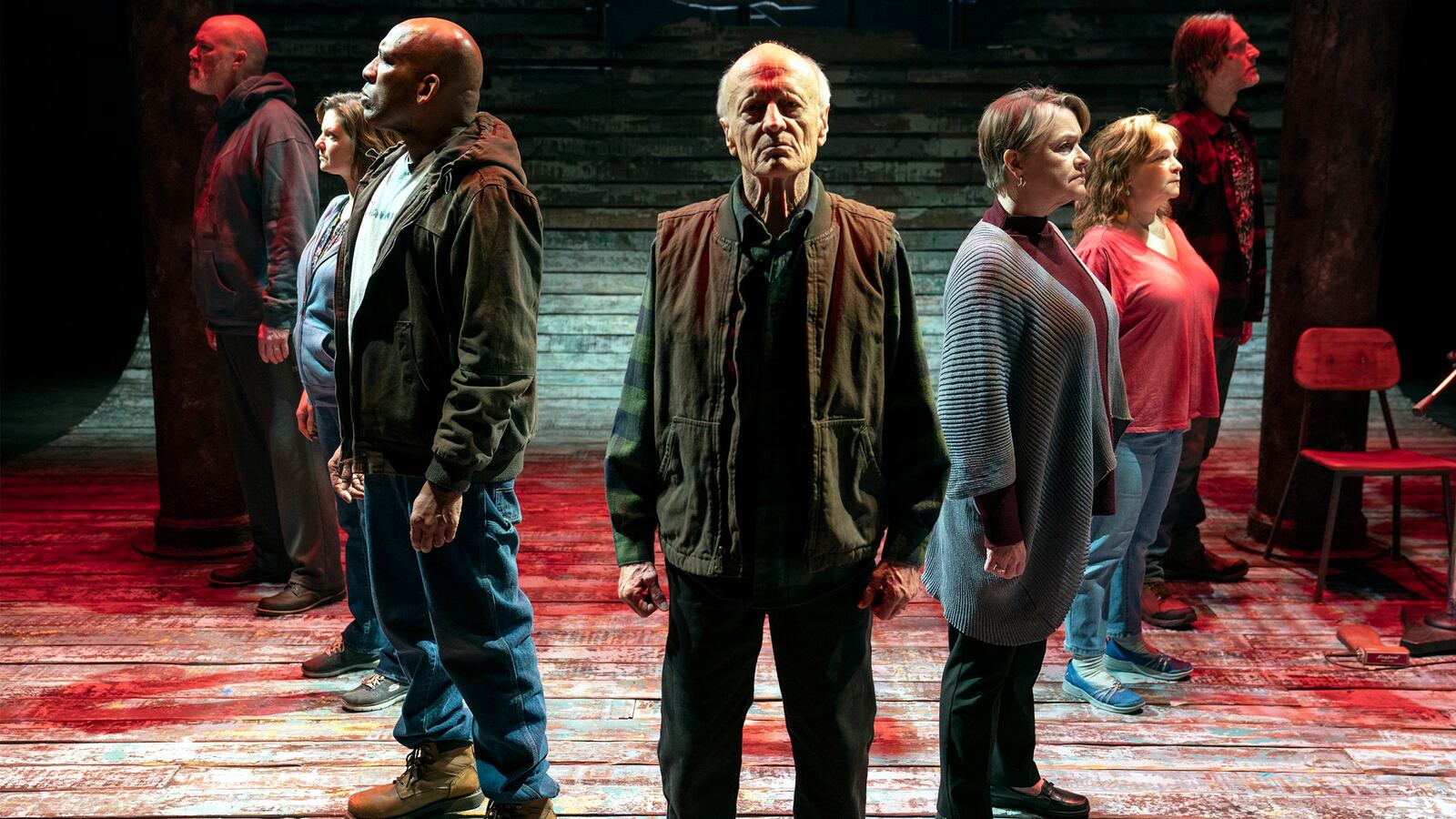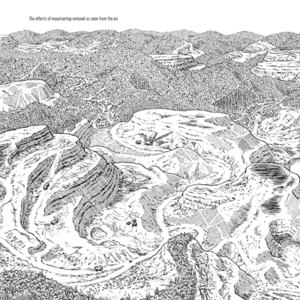Coal Country (running to April 5) is a beautiful piece of theater about a terrible event. In 2010, 29 miners died after an explosion at the Upper Big Branch mine in West Virginia, owned by Massey Energy. Dotted throughout the Public Theater’s Anspacher space are 29 bulbs to signify every life lost (the lighting designer is David Lander). As each name is read out, a bulb is briefly illuminated.
On a sparsely decorated stage, the singer-songwriter Steve Earle sits to the side and sings seven of the songs he has recorded for Ghosts of West Virginia, his new album focusing on the lives of Appalachian miners. Alongside Earle, a collection of performers speak the words of locals and loved ones who told playwrights Jessica Blank (who also directs) and Erik Jensen about what happened at the mine, and what happened next.
Mining life, and the family and domestic lives around the mine, are sketched by characters Gary Quarles (Thomas Kopache), Tommy Davis (Michael Laurence), Stanley Stewart (known to all as “Goose,” played by Michael Gaston), his wife, Mindi (Amelia Campbell), Patti Stover (Mary Bacon), Roosevelt Lynch Jr. (Ezra Knight), and Dr. Judy Petersen (Deirdre Madigan).
Former Massey CEO Donald L. Blankenship was ultimately convicted of conspiring to violate federal mine safety standards and sentenced to a year in prison as well as paying a $250,000 fine. It seemed offensively paltry, considering how many people had died—and why they had died.
Blankenship’s sentencing by Judge Irene C. Berger (Melinda Tanner) is where Coal Country begins and ends. What unfolds in the play is a piercing, intensely human story of proud and dedicated workers whose lives were sacrificed to capitalism at its most venal and reckless. The mine’s employees’ lives were put at risk, and snuffed out, simply because of Massey’s all-consuming desire for profit. We learn that Blankenship received production reports every 30 minutes.
This is not the first time that Blank and Jensen—who first went to West Virginia in 2016—have precisely focused on the human cost of major events. They also conceived The Exonerated (about death row prisoners) and Aftermath (about Iraqi refugees).
The cast are uniformly excellent. Gary, Tommy, and Goose are bluff, robust men from generations of mine workers, and who are ultimately shattered by the events that unfold. Mindi is a wry rock of support for husband Goose. The reticent and steely Patti is married to the unseen Greg.
We hear of the couples falling in love, the meet-cutes lessening the tension. Roosevelt tells us about growing up black in the area and his dad, sourcing pop music by the charts printed in Jet magazine. Dr. Petersen talks about about growing up in the woods, before her job elevates her a class bracket or two and separates her from those she had grown up around.
The play explains to us about the workings of the mine, and the conditions—and corporate negligence—that led to the explosion. The back of Richard Hoover’s stage is ripped and glows violently red-orange, but that is the only stage effect, along with some smoke. Otherwise, the characters unpeel the story direct to us.
Coal Country is only 90 minutes, but it is incredibly powerful. Blank and Jensen are not just excellent interviewers, they are excellent writers and distillers of material. The stories run in parallel with each other, and so we see how the prelude to disaster takes shape both below the ground and also above—and the strange things that stick in the characters’ minds, like a gas station with no queue suddenly having one.
The particularities of grief and loss—a body recoiling to supportive touch, lives and futures suddenly vaporized, hoping against hope that a loved one has survived—are set against rising, rumbling anger when the scale and nature of Massey’s neglectful stewardship of the mine is laid bare. They prioritized profit over human life, the almighty dollar over the welfare of their own workers making that almighty dollar.
The only thing missing is a bringing-us-up-to-date coda around the mine and the characters now. It would benefit from that, given the trajectory of events that it sketches.
Coal Country is otherwise riveting, impressive, and startling. It could have opted for more pathos and a more direct play to our tear ducts. It could contain more anger and political rabble-rousing. But it doesn’t. Like the best oral histories, it simply tells us its interlocking stories in the authentic voices of those surviving community members who are dry, witty, strong, wounded, and resilient—and resistant to both pity and being patronized. The profound depth and impact of the play comes both from its material and its company’s splendid performances.
The Hot Wing King

Katori Hall’s play (Signature, to March 22) is, appropriately given its food theme, an energetically stirred mix of comedy and drama. A group of black gay friends—the “New Wing Order”—have gathered at the Memphis home of Cordell (Toussaint Jeanlouis) to help him make chicken wings and delectable sauces to win the local “Hot Wang Festival.”
Cordell is coupled with Dwayne (Korey Jackson), and they’re happy, but also struggling with Cordell’s elongated breakup with his female ex-partner and estrangement from his children. Isom (Sheldon Best) is the very camp, very tough, very funny show-stealer, in whose uneasy hands the special sauce mixing is left. He may or may not get more romantically involved with Big Charles (Nicco Annan). Meanwhile, T.J. (Eric B. Robinson), Dwayne’s shady brother, is struggling to raise his son Everett/E.J. (Cecil Blutcher), who comes to cuckoo-in-the-nest at Cordell and Dwayne’s.
The play, directed with a lot of energy by Steve H. Broadnax III, is both raucously funny and at moments more serious in examining the lives, desires, struggles, and joy of black gay men. That it should still feel so rare to see a group of black gay men loving, laughing, and discussing their lives on stage should encourage theaters to commission more such writing.
Two delicious things apart from those wings (the smell of which fills the theater): Perfect vengeance is visited upon T.J. for his homophobia; and the men’s Luther Vandross song-and-dance routine to “Never Too Much”—recalling the Boys in the Band characters’ rendition of “Heatwave”—stands tall for the play’s generous, ultimately positive spirit.
The Perplexed

The title says everything about how Richard Greenburg’s oddly constructed and written play may leave you feeling (MTC, to March 29). It is about two very fancy, conflict-prone families getting together to celebrate a wedding, set solely in a side room to the unseen main event—a place of refuge and confrontation. This plush setting inevitably becomes an arena of dysfunction and complication, which is mostly puzzling and occasionally grimace-inducing.
What, for example, is the point of writing a storyline about aversion therapy—making clear how violent it was, and the damage it subsequently has done—for this to be resolved by the man concerned thanking his wife for being so kind for so many years? Even if she has, this plot feels more inadequate than thought through.
Also leaving a bad taste: The only person of color on stage, a nurse, sees something bad she feels she must report to her superiors. Suddenly—how Knives Out—she holds the fates of the rich people in her hands. Not for long; she is then tricked into withdrawing her allegations and thereby stripped of whatever power she had.
Added into the mix: a gay son who does porn; a writer who is so much smarter than everyone else (of course he is, and angry about Trump and his ilk); and a lovelorn family friend, who is set to conduct the marriage, when—yep—he thinks he’s in love with the bride.
The performances flicker genially along, with the actors trying to make sense of this airless play’s strange gaps and leaps in tone. Like its characters, The Perplexed feels way too satisfied with itself to be any kind of pleasure. RSVP, decline.






